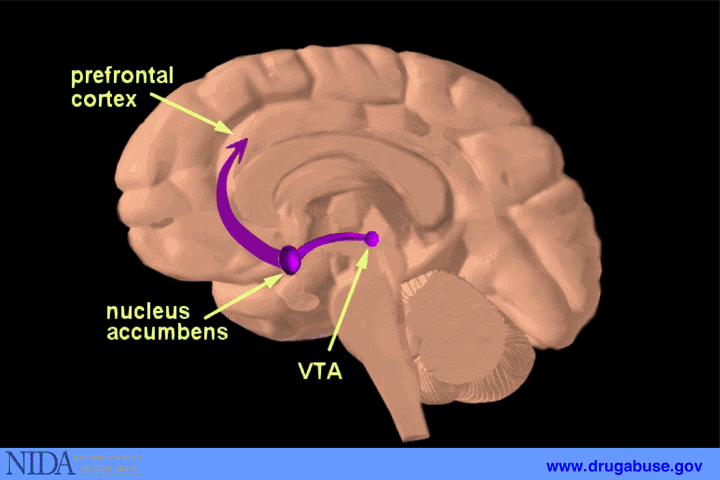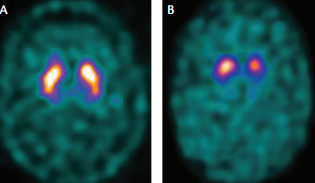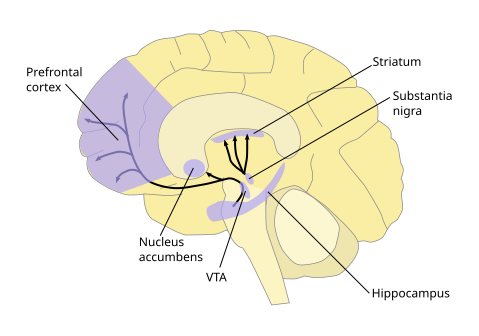IB Syllabus focus:
'- Role in behavior and mood
- Disorders linked to dopamine imbalances
- Treatment implications'
Dopamine is a crucial neurotransmitter in the brain, playing pivotal roles in regulating mood, behaviour, and several other physiological processes. Understanding its functions, related disorders, and treatment implications is fundamental in the biological approach to psychology. It's worth noting how dopamine's effects are intertwined with the localisation of function within the brain, emphasising its role in specific brain areas.
Role in Behaviour and Mood
Behaviour
Dopamine is commonly known as the "feel-good" neurotransmitter, as it is closely associated with feelings of pleasure and reward. It influences various behaviours by:
Motivation: Dopamine is crucial for developing motivation and drive. It allows individuals to plan and find enjoyment in accomplishing tasks.
Reward and Pleasure: It’s integral in the reward pathway of the brain, creating feelings of enjoyment and reinforcement to proactively perform activities. This mechanism is closely linked to the synaptic transmission process, highlighting the chemical basis of how dopamine functions.

The reward pathway involves dopamine neurons in the ventral tegmental area (VTA) projecting to the nucleus accumbens and prefrontal cortex, supporting motivation, reinforcement, and pleasure. This circuit explains why rewarding stimuli—and many addictive drugs—produce dopamine signals that shape behaviour. Source.
Decision-Making: Dopamine levels can affect the decision-making processes and risk-taking behaviours, contributing to impulse control.
Mood
Elevation in Mood: Elevated levels can lead to feelings of euphoria, bliss, and enhanced motivation and concentration. The interplay between dopamine and mood regulation can be further understood by exploring neuroplasticity, which explains the brain's ability to adapt and change as a result of experience.
Mood Regulation: It’s pivotal in maintaining normal mood states and can contribute to the development of mood disorders when imbalanced.
Disorders Linked to Dopamine Imbalances
Hypodopaminergia (Low Levels)
Parkinson’s Disease
Characterised by motor impairments such as tremors and bradykinesia.
It's associated with a decline in dopamine-producing neurons in the substantia nigra.

Dopamine transporter (DaT) SPECT images show the tracer pattern in the striatum: a normal scan displays symmetric “comma-shaped” uptake, whereas Parkinson’s disease shows reduced putaminal signal with relative sparing of the caudate. This pattern reflects nigrostriatal dopaminergic loss underlying motor symptoms. Source.
Symptoms: Rigidity, postural instability, and reduced facial expressions.
Depression
Low dopamine levels can be linked to feelings of apathy, lack of interest in life, and low mood and can lead to states of depression.
Symptoms: Persistent sadness, loss of interest, and hopelessness.
Hyperdopaminergia (High Levels)
Schizophrenia
Overactivity of dopamine transmission can contribute to symptoms of schizophrenia.
Symptoms: Hallucinations, delusions, and thought disorders.
Bipolar Disorder
Elevated dopamine levels are associated with manic phases, leading to increased energy and other heightened states.
Symptoms: Euphoria, increased energy, reduced need for sleep.
Substance Abuse
Many addictive drugs increase dopamine neuronal activity, reinforcing drug-taking behaviours.
Implications: Continued use of such substances can alter the brain’s dopamine system, leading to addiction. The relationship between dopamine and pheromones in humans also provides insight into how chemical signals can influence behavioural responses and mood states.
Treatment Implications
Medications
Antipsychotics
Used primarily to treat disorders like schizophrenia, these can block dopamine receptors, reducing excessive dopaminergic activity.

Schematic of the four principal dopaminergic pathways: mesolimbic (reward and reinforcement), mesocortical (cognition and decision-making), nigrostriatal (motor control), and tuberoinfundibular (neuroendocrine regulation). This overview clarifies how different circuits relate to symptoms and treatment effects (e.g., motor side-effects when nigrostriatal signaling is disrupted). Extra detail: the tuberoinfundibular pathway is beyond core IB requirements but aids understanding of hormonal side-effects. Source.Examples: Risperidone, Chlorpromazine.
Concerns: Long-term use can lead to a condition called tardive dyskinesia, marked by involuntary movements.
Dopamine Agonists
Mimic the role of dopamine in the brain, stimulating dopamine receptors.
Uses: Treatment for conditions like Parkinson’s disease.
Examples: Pramipexole, Ropinirole.
Risks: They can induce compulsive behaviours in some individuals, such as gambling or overeating.
Dopamine Precursors
Increase dopamine levels indirectly by providing the brain with the raw materials needed to produce dopamine.
Example: Levodopa (L-DOPA) is used in Parkinson’s disease treatment.
Selective Serotonin Reuptake Inhibitors (SSRIs) and Serotonin-Norepinephrine Reuptake Inhibitors (SNRIs)
Often used to treat depression, these can impact dopamine levels indirectly by modifying levels of other neurotransmitters.
Considerations: They should be used with caution due to their broad impact on neurotransmitter levels.
Behavioural and Psychological Interventions
Cognitive-Behavioural Therapy (CBT)
Can be used to address behavioural issues related to dopamine imbalances such as impulse control disorders.
Application: Teaches coping strategies and problem-solving skills to manage stress and challenges.
Mindfulness and Meditation
These can help in managing stress and can have a positive impact on neurotransmitter levels, possibly affecting dopamine levels.
Benefits: Can aid in mood regulation and reduction of anxiety and depressive symptoms.
Lifestyle Interventions
Regular exercise, a balanced diet, and adequate sleep can play an integral role in maintaining balanced dopamine levels.
Recommendation: A healthy lifestyle can serve as a foundational component in managing disorders related to dopamine imbalances.
Biofeedback and Neurofeedback
Techniques to gain awareness and control over certain physiological functions to improve health or performance.
Utility: Helpful in managing symptoms of various neurological and mood disorders by potentially modifying neurotransmitter levels.
Ethical Considerations in Treatment
Informed Consent
Before initiating any treatment, especially pharmacological interventions, healthcare providers must ensure that patients are fully informed about the potential risks and benefits. This process is paramount, as highlighted in discussions on the ethical considerations in animal studies, which underline the importance of ethics in research.
Individual Variations
Recognising the individual differences in response to medications is vital. What works for one person may not be effective or may cause adverse reactions in another.
Stigma
People suffering from disorders related to dopamine imbalances may face societal stigma, impacting their willingness to seek treatment. It is crucial to foster an environment of understanding and acceptance to encourage individuals to seek help when needed.
Ongoing Research
Given the complexity of neurotransmitter systems, ongoing research is crucial to explore newer and more effective treatments with minimal side effects, to address dopamine-related disorders more efficiently.
Understanding dopamine’s role in behaviour and mood, the disorders arising from its imbalance, and the implications of these in treatment, provides a comprehensive insight into the intricate workings of the human brain and its influence on our actions and experiences.
FAQ
Yes, alterations in diet can significantly impact dopamine levels. Consuming foods rich in tyrosine, the precursor to dopamine, such as bananas, avocados, and proteins like fish and eggs, can potentially elevate dopamine levels in the brain. This increase can subsequently affect mood and behaviour, potentially enhancing feelings of pleasure, mood elevation, and motivation. Additionally, maintaining a balanced diet can ensure the adequate availability of other precursors and cofactors essential for dopamine synthesis and function, such as vitamin B6 and folic acid, thereby supporting overall mental health and wellbeing.
Substance abuse significantly impacts dopamine levels. Drugs like cocaine and amphetamines can increase dopamine levels by blocking its reuptake, leading to intense but temporary feelings of euphoria. The constant exposure to elevated dopamine levels alters the brain’s reward system, leading to increased tolerance and requiring higher quantities of the substance to achieve the same pleasurable effects. This modification in the reward pathway can lead to addictive behaviours, impairing the individual’s ability to experience pleasure through naturally rewarding activities and making the avoidance of the substance extremely difficult, thus altering behavioural patterns substantially.
Yes, dopamine levels can be measured, primarily through a cerebrospinal fluid (CSF) test, which involves collecting fluid from the spinal column. This procedure is intricate and is typically reserved for specific clinical investigations. Additionally, blood and urine tests can give indirect measures by assessing the levels of dopamine metabolites, which are products of dopamine breakdown. While these methods can provide insights, it’s crucial to understand that peripheral measurements do not directly reflect dopamine concentrations in the brain due to the blood-brain barrier, hence the interpretations drawn from these tests should be made with caution.
Regular exercise has been shown to positively impact dopamine levels. Aerobic activities, in particular, can increase the production of dopamine in the brain, contributing to improvements in mood, attention, and learning. The elevated dopamine levels resulting from regular exercise can lead to enhanced mood, reduced stress, and improved overall cognitive function. Additionally, exercise-induced increases in dopamine are associated with enhanced motivation and pleasure, potentially serving as a natural and healthy way to elevate mood and mitigate the effects of conditions associated with dopamine imbalances, such as depression and attention deficit hyperactivity disorder (ADHD).
Indeed, several lifestyle modifications and natural approaches can aid in maintaining balanced dopamine levels. Regular physical activity, a balanced and nutritious diet, and adequate sleep are fundamental in supporting dopamine synthesis and function. Managing stress through mindfulness, meditation, and relaxation techniques can also mitigate adverse effects on neurotransmitter levels, including dopamine. Avoiding excessive intake of alcohol, drugs, and certain medications can prevent disruptions in dopamine levels. Furthermore, engaging in activities that are rewarding and pleasurable, such as hobbies and social interactions, can naturally enhance dopamine levels, promoting overall well-being and mental health.
Practice Questions
Treating disorders related to dopamine imbalances necessitates ethical diligence. Informed consent is pivotal; healthcare providers must elucidate potential risks and benefits of treatments, especially with pharmacological interventions, respecting patients’ autonomy in their healthcare decisions. Acknowledging individual variations is also essential as a treatment effective for one might have adverse effects on another, necessitating personalized treatment plans. Additionally, societal stigma related to dopamine-related disorders can hinder individuals from seeking treatment. A non-judgemental, empathetic approach is crucial in healthcare settings to alleviate the fear associated with societal prejudices. Lastly, ongoing research must be conducted responsibly, considering long-term impacts and focusing on refining treatment modalities.
Imbalances in dopamine, a key neurotransmitter, are crucial in the onset of various psychological disorders. Low levels, termed Hypodopaminergia, can lead to Parkinson’s disease, characterised by motor impairments and caused by the decline of dopamine-producing neurons in the substantia nigra. Similarly, low dopamine levels can manifest as depression, marked by persistent sadness and a loss of interest in life. Conversely, elevated levels or Hyperdopaminergia can contribute to schizophrenia, presenting with hallucinations and delusions, and bipolar disorder, associated with euphoria and increased energy during manic phases. Additionally, high dopamine levels reinforce substance abuse behaviours due to increased feelings of pleasure and reward.

